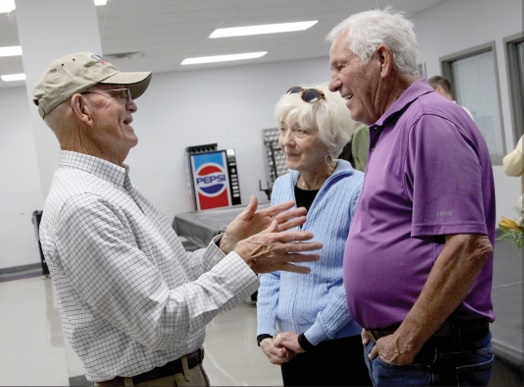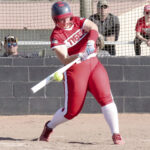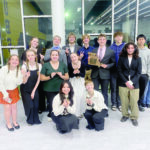Decision on Shell Knob library sparks controversy
The change in plans to build a new branch of the Barry-Lawrence Regional Library in Shell Knob has generated a sharp rebuke from those who donated land for the proposed project.
Donors are seeking answers as they criticize the change in direction by the library board. Chuck Singleton, who donated land for a new branch with Danny Street, has taken personal offense at the change of direction, since the land offered came with the caveat to name the new facility for his mother, who has since passed away.
“One of the last things my mother said was about her regret not living long enough to see the new library,” Singleton said. “We’re out $15,000 for taking the land back, Despite numerous emails, they just ignored us. We could have sold the land for $250,000. I’ve never been treated worse in my life.”
Singleton and Spears both expressed concerns over why the library board took 10 years to decide against using the land they offered.
They disputed reasons offered by Gina Milburn, library director, for finally deciding against building on the property. Singleton expressed doubts that the library ever intended to build on the land accepted on a 10-year offer, then returned in when the time expired.
“I own half the airport in Shell Knob,” Singleton said. “I’ve had a house there for 30 years. I’ve donated hundreds of thousands of dollars to the community. Two years ago, when they hadn’t done anything with the land, I offered them a two-year extension.”
As for the time spent making a decision to build, Milburn said Singleton and Street had written in their deed that if the Barry-Lawrence Regional Library failed to construct a public library within 10 years, the property’s ownership reverted back to Singleton and Street.
“The 10 years had nearly expired,” she said. “This fact explains the timing. It is worth noting that the library district invited Mr. Singleton to speak to the board prior to deciding whether to reject the property. Neither Mr. Singleton nor Mr. Street elected to do so.”
Street, who has built many homes in Shell Knob, disputed the contention that the donated land was unsuitable for construction of a library.
“The back side, east of the property, is solid rock,” Street said. “The land has shot rock on it, the best fill material you can use. Highways are built on top of it. Table Rock Dam has shot rock in it. The ground doesn’t move after that.”
Street said the assertion that the site offered had unstable fill on it was not backed up by his experience as a builder. Moreover, he said the geotechnical study by the Springfield engineering firm of Palmerton and Parrish, undertaken at a cost of $16,000 by the library board in November 2023, did not conclude the land was unsuitable. On the contrary, he said the study backed his view that the land was suitable.
The study itself found underground levels of bedrock varied, making it difficult to estimate the amount of excavation necessary for setting a foundation. Topsoil on the site was rather shallow, not suitable for sale. Two borings found “relatively deep undocumented fill material” as far down as eight feet. As for the land being untouched, the study declared, “Based on historic aerial imagery, the subject site has had some amount of earthwork performed on it between the years 1997 and 2003. Additionally, a possible limestone/dolomite quarry was noted on the northeast corner of the subject site.”
Engineers advised over-excavating bedrock to reach solid footing, recommended reinforcing steel footings mounted on bedrock to establish a firm foundation. The study advised making a more comprehensive geotechnical study before construction, and possible design modifications of the building in case subsoil conditions did not match Palmerton and Parrish’s assessment.
The study did not make a declaration on the site’s suitability for a library, but instead focused on ways the site could be made to work. Engineers cautioned that their study only reflected findings made through six borings that may not reflect the entire site. The boring samples found only 25 percent of the rock quality as “good to excellent,” and 50 percent to be less than “fair.”
Singleton went so far as to assert the geotechnical study was done as a cover to pull out of the project.
“In our official letter to Singleton and Street, the library did not claim that its property was wholly unsuitable – quite the opposite,” Milburn responded. “We stated that given the geotechnical study, the board opted not to pursue building on their property due to the likelihood of additional costs but did also mention other factors.”
Singleton challenged Milburn’s assertion that to hook up to utilities, building on the site would have cost around $1 million more than to construct on the Shell Knob Plaza, which has access to utilities.
“At no point did the library ever provide a specific cost,” Milburn said. “We could not possibly definitively know the exact figure. No estimate was part of our statement to the public nor was communicated to Mr. Singleton and Mr. Street.”
Singleton noted the property, owned by Street for 10 years, facing the lake, was far more attractive and more protected from traffic.
“No one thinks they’re going to remodel [the library at the plaza],” Singleton said. “One of the buildings there is falling down. It would be putting good money into bad.”
Building onto the mall, Singleton continued, was contrary to what donors supported. He has asked the library board to account for the donations made to the Shell Knob library project, going so far as to suggest the money was diverted to pay for the new Monett branch. He subsequently filed a request for proof of how donations for the Shell Knob branch have been used.
To that accusation, Milburn responded emphatically.
“The library district provided Mr. Singleton with everything in his FOIA [Freedom of Information Act] request,” she said. “The insinuation that donations have been misappropriated by the library is 100 percent baseless. The library district has a separate account for the Shell Knob Building Fund.”
Street said the library board’s decision to return the land followed a pattern of neglect over the decade the property had been given to the library district.
“They’d done nothing to the property,” he said. “Trees have grown up. It was never mowed. People dumped trash on it.”
Singleton and Street felt most aggrieved that they had gifted the property with title insurance, documenting the land was clear of any legal liens or claims against it. The library returned it by a quit-claim deed.
“If there’s a lien filed against the library board, we couldn’t sell it,” Street said. “Title insurance will cost us around $500 to have it cleared again before we can sell it.”
Milburn, in response, said the quit claim deed used to convey the property back to Singleton and Street was sent to the library from Singleton.
“It was signed at the advice and direction of the library’s counsel, Jim Randall,” she said. “The library was not obligated by contract or otherwise to provide a ‘title insurance study.’ Singleton and Street did not provide a title search or policy to the library when the donation was made.”
Street went on to say his next step is getting more money involved.
“I will have to file a small claims suit and let a judge decide what needs to be done,” he said. “Had this happened earlier, we could have sold the land and moved on. First it has to be cleaned up.”




